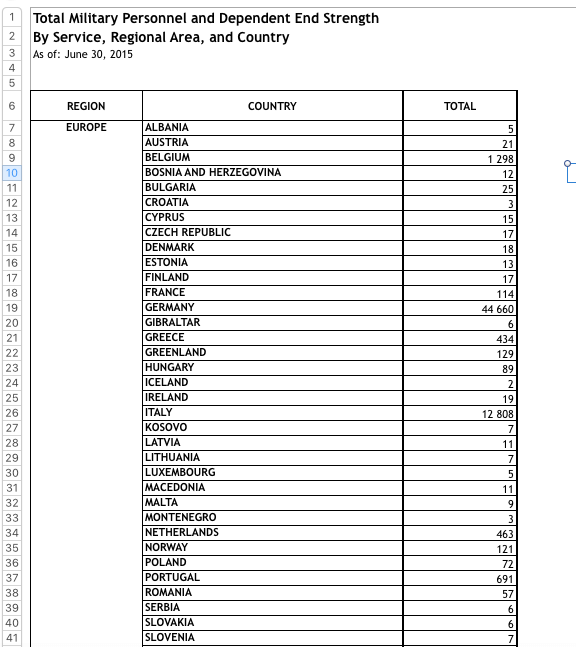Ricochet is the best place on the internet to discuss the issues of the day, either through commenting on posts or writing your own for our active and dynamic community in a fully moderated environment. In addition, the Ricochet Audio Network offers over 50 original podcasts with new episodes released every day.
 An Autarky Thought Experiment
An Autarky Thought Experiment
In response to my post about refugee bonds, the Great Ghost of Gödel left this comment obiter dicta:
Not without trepidation or regret have I come around to the Fortress America position, but here I am. Bring all of our troops stationed overseas home. Defend our borders without mercy. If the rest of the world is hell bent for leather on destroying itself, whether rapidly with open war or slowly with insane economics and/or immigration policy, so what? We’re perfectly capable of being self-sufficient as a nation, and it never was a good idea to be the world’s police. …
In short: we need to quit acting like we need the rest of the world at all, let alone that we need the rest of the world’s governments to like us. We’re supposed to be different from everyone else. So let’s actually be different, keep attracting people because we’re better, and make no excuses for being better — and being loners.
What about trade, I asked? How would we ensure freedom of navigation without the US Navy? He proposed that if people want to trade with world beyond our territorial waters, they can hire their own navy:
The Navy is appropriate within our territorial waters, and of course there is extensive maritime law with respect to what that means.
Beyond that, I think a private security/defense model, presumably attached to some kind of insurance system, is appropriate. This is, of course, also historically precedented, by the security and defense approaches taken by the British East India Company, et al. I think it’s reasonable to imagine similar arrangements without the connection to colonization. It might look something like this. …
Keep in mind I’m suggesting this as a contingency upon international trade being “not worth it,” as measured by actuaries insuring international shipping, who in turn are paying security forces to protect them. In other words, if the fixed costs of security and insurance leave international trade profitable, great! If not, I’d call that a pretty good definition of “the world has gone to hell,” wouldn’t you?
So let’s take this idea seriously. Let’s imagine what would happen if tomorrow we brought all of our troops stationed overseas home. We bring back the subs and the aircraft carriers, and if anyone complains about the pirates, we tell them to go out and rent themselves some sepoys and find someone to insure their own aircraft carriers. Freedom of navigation’s their problem.
As of tomorrow, every one of these men and women shutters the bases, closes up shop, and sails back to CONUS:









They bring their gear back with them, of course. Especially the nukes and the missile interceptors. We’re not leaving that stuff in someone else’s hands.
What do you think would happen? What would the headlines look like in a month’s time, in your view? What about a year?
Would it be in our interests, overall?
Source: DoD Personnel, Workforce Reports & Publications, Active Duty Military Personnel by Service by Region/Country Total DoD – June 30, 2015 (DMDC Data)
Published in Foreign Policy, General, Military



Aside from a rearmed Japan, I think a rising (and nuclear armed) India might have something to say about that.
India strikes me as a natural and durable American ally in the region, I think they would be willing to trade with us and the American and Indian navies could jointly protect the sea lanes between us.
Does any one so labor? Doesn’t any unforced transaction have to work to the advantage of both parties? Because deals that don’t, don’t get done?
I’m pressed to think of an instance since Joseph, the seven fat years, and the seven lean years when national prepping was a good idea (nonpolitically, politically it’s a sure winner). Maybe I’m just scarred by the 70s oil “crisis” or the persistent residue of 20th-century war socialism (strategic reserves cluttering the place up), but crossing bridges before you come to them just don’t seem to pay. You’d think a nation that left its opponents in smoking ruins after WWII from a flat-footed start would have more confidence in its ability to deal with events. Or nations that lifted themselves out of those smoking ruins in a few short years for that matter.
True of Japan, but let’s all stop kidding ourselves that the US defeated Germany. It was defeated by in large by the Soviet Union.
I don’t think you can have it both ways. We are either going to stay engaged to push for free trade or we become isolationist. If you think we can limit our engagement to just this hemisphere you are mistaken. Once we declare a sphere of influence of any size we will be forced to grow it in order to defend it. That is what we did to get to this point.
Really? You think without us landing on Normandy and supplying the Soviets with food and gun they would have marched to Berlin? Who bombed the German industrial heart land? Who blockaded them? Who kept them busy in Italy and North Africa? The Soviets needed us way more than we needed them. We could have beaten Germany on our own, though I agree it would have been harder and more costly. The Soviets never could have sustained their effort without us.
Val,
Why Val you may have found a fundamental flaw in GGofG’s argument. To have alliances one must reach out and help the ally. At least one must do it reliably enough to maintain the alliance. Pure isolation precludes the possibility of building strategic alliances and maintaining them.
Nice job Val.
Regards,
Jim
Why? Why is that inevitable?
From a pure great powers realpolitik perspective, I can see why for instance Russia would be upset with our “meddling” in Ukraine or admitting the Baltic states or Georgia into NATO: that is their sphere of influence, their backyard. It’s the same reason JFK drew a line in the sand over missiles in Cuba.
Why couldn’t we strike a quiet bargain that says: Russian, you can boss around Eastern Europe, we won’t interfere. China, what you do in Taiwan is none of our business. Just don’t meddle in the Americas and we’ll all get along fine.
It’s just a thought experiment, I’d feel bad about leaving some of our most loyal allies high and dry, but I think Russia and China would be satisfied with such a grand bargain. I don’t think either is plotting to take over the entire world, nor is either strong enough to effectively project power into our backyard even if they wanted to.
This has led to a very interesting discussion, but boy, there sure is a lot of putting words in my mouth!
You think?
It really doesn’t take much. If they felt like projecting power into our backyard, that’s really all they’d have to do.
Gosh, I have always felt the US should behave in a more imperial fashion abroad, and be a republic at home. I always figured these two did not go together.
Alas, right now, we are behaving as a weak republic abroad, with imperial rule at home.
I say it is inevitable because that is what I see when looking back at history. There were grand bargains prior to WWI too. Prior to German unification, prior to the Napoleonic War. History is replete with grand world sharing bargains that culminate in a war between powers.
What keeps Iran from loading a large and crude nuke onto a container ship, and detonating 200 miles offshore LA or SFO? Imagine the terror from the radiation fallout.
Don’t assume that retaliatory capability means the Bad Guys will act rationally. They want to precipitate armageddon, and do not mind if many people die. Remember: England left India because they were unwilling to murder people. Islamic fundamentalists are not similarly soft.
There are thousands of products in the world that are quite important to our way of life… unique resins or adhesives or materials that allow cars or airplanes or computers or networks to function. These are made all kinds of places.
The US could be held hostage by a hostile power who threatens supply of any of these. We would adapt, of course, at some cost and disruption. But the value to the United States of open and free exchange of goods and services can hardly be understated. If we tried to be truly self-sufficient, technology and development would be forced back decades.
Don’t understand why I should care more about many South American countries than Taiwan. Who gives bleep about S. America, and, for that matter, most of Central America? Taiwan is a major trading partner and bonafide free country.
Are you saying that the rest of us don’t know what we are talking about? :)
I wonder if that’s true. We hear all the time that the Iranians don’t care if millions die, etc. But couldn’t that just be posturing?
It’s a great tactic to get your adversaries to believe you are crazy enough to fight to the death without caring about the cost. If they believe it they will give you a wide berth and let you get away with murder, so to speak.
Is there behavioral (as opposed to rhetorical) evidence that the Iranians are that crazy that they would be indifferent to an American or Israeli nuclear strike?
Suicide Bombers.
Saddam Hussein’s refusal to negotiate even with the US Army about to roll.
The beauty of a nuclear ship offshore is that the US could not easily be certain that the ship was from the Norks, or Iran, or some proxy radical group that bought/stole a weapon… would the US nuke a country, killing millions of innocent civilians, if it was not certain who was responsible?
Even from a rational self-interest perspective, terror using nuclear weapons could quite reasonably be accomplished without fear of nuclear retaliation.
Not Iranians, though.
Probably true, certainly possible, but doesn’t address the question of whether they really are as suicidal as they want us to think.
We tried autarky once before (see tariff, Smoot-Hawley); it was called “The Great Depression.” That said, I’m all for bringing the troops home.
We can do the Expected Value. What chance do you assign to the Iranians willing to detonate a nuke somewhere? What is the cost to us if they do it?
I agree that Iran with Nukes is not 80% sure to detonate. But I think it is probably 50%. And even 5% makes us act to prevent giving them the chance to decide.
?
We will always know where a nuke came from. The radioactive footprint will tell us.
Also, Saddam was ready to negotiate in the end. Wasn’t he?
Even if they deny it?
Imagine: Iran gives a nuke to Hizbullah, who pass it through numerous intermediaries before it is finally used.
Would you be willing to incinerate millions of innocent people as a result? Because the Iranian people are, in fact, largely innocent, whatever their government does. And even the government may not have known how the nuke would end up being used.
That’s sort of my point. The Iranians figure we would be squeamish about nuking them, and they want us to think that they would not be all that upset if we did. This way, we have to bend to their demands or they can threaten us with their nukes.
I agree fully that we must not, under any circumstances, allow them to have those nukes. If, that is, it can be prevented in a post-Obama world.
The current US. alliance system was actually created to address the failings of prior “balance of power” arrangements. Balance-of-power thinking dominated global politics since (if memory serves), the Peace of Westphalia through World War II. Each balance-of-power arrangement would collapse in a bloody war, and thanks to technological progress, these wars were getting exponentially more destructive. American policymakers after World War II wanted to break this cycle.
Yes. In fact, I would rather every single person in Iran die than one American civilian. How many Americans are you willing to see die to save the life of one Iranian?
How would Obama decide?
I answered your question. You need to answer mine before I answer any more from you.
How man Americans are YOU, iWe willing to see die to save the life of one Iranian?